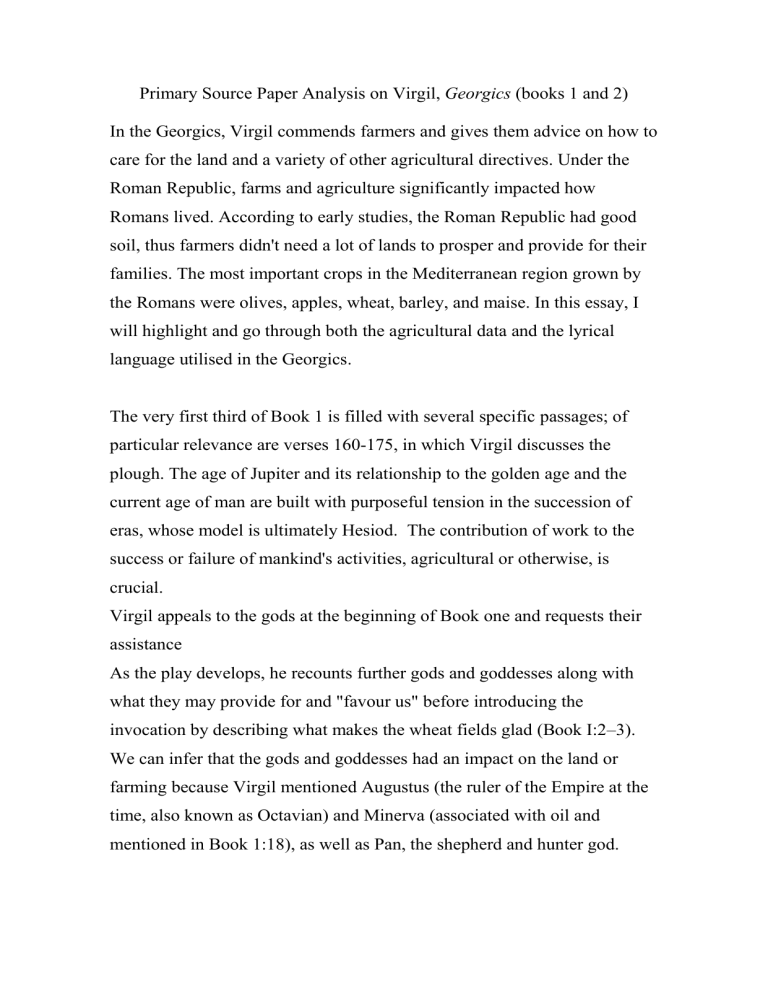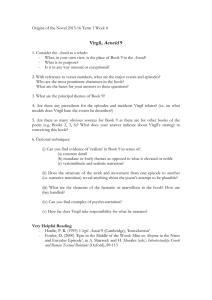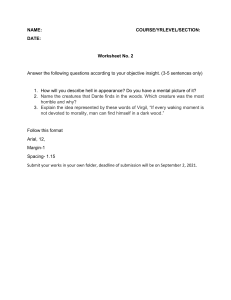
Primary Source Paper Analysis on Virgil, Georgics (books 1 and 2) In the Georgics, Virgil commends farmers and gives them advice on how to care for the land and a variety of other agricultural directives. Under the Roman Republic, farms and agriculture significantly impacted how Romans lived. According to early studies, the Roman Republic had good soil, thus farmers didn't need a lot of lands to prosper and provide for their families. The most important crops in the Mediterranean region grown by the Romans were olives, apples, wheat, barley, and maise. In this essay, I will highlight and go through both the agricultural data and the lyrical language utilised in the Georgics. The very first third of Book 1 is filled with several specific passages; of particular relevance are verses 160-175, in which Virgil discusses the plough. The age of Jupiter and its relationship to the golden age and the current age of man are built with purposeful tension in the succession of eras, whose model is ultimately Hesiod. The contribution of work to the success or failure of mankind's activities, agricultural or otherwise, is crucial. Virgil appeals to the gods at the beginning of Book one and requests their assistance As the play develops, he recounts further gods and goddesses along with what they may provide for and "favour us" before introducing the invocation by describing what makes the wheat fields glad (Book I:2–3). We can infer that the gods and goddesses had an impact on the land or farming because Virgil mentioned Augustus (the ruler of the Empire at the time, also known as Octavian) and Minerva (associated with oil and mentioned in Book 1:18), as well as Pan, the shepherd and hunter god. The name Augustus, which Virgil uses in his invocations, is unusual because poets and other authors often only invoke deities and heroes. This leads us to believe that Virgil probably introduced Augustus to the play because he was likely going to become a deity after he died. In Book 1 (43–70), the author begins by explaining how farmers used to get ready to farm in cold weather. As the Book progresses, it delves deeper into how they analyzed and waited until nature complied with them and they could choose which parts of the field were ideal for growing particular things.The Greek deity Tmolus, also known as the mountain god, assisted the farmers and the chalybes by delivering them goods and products that would enable them to produce in the spring, as can be seen at the play's conclusion. Since two Greek gods (Tmolus and Decalius) were referenced and we can determine that Greek theatre did impact Roman plays and theatre, this section of the plays may also demonstrate the effect that the Greeks had over the Romans. The first two sections of the book are also used by Virgil to provide instructions, which are very detailed and explain how to avoid wasting resources and being ineffective. The author shows how it is better to sow a plant beneath a location where you previously collected another plant. He also emphasises the necessity of rotation for the survival of the art. We can also see that they pushed people to cover the dry crops with burning ashes and to flood the barren soil with human waste. The hoewielding, willow-harrow-dragging people will win Ceres, the goddess of agriculture, over, the author reveals at the play's conclusion. He also emphasises the benefits of diligent workers who remain and level the playing field over time. (Book I: 27). Virgil frequently emphasises the importance of hard labour and how vital it is to put in effort if one wishes to flourish and, in many cases, be able to support one's family or oneself. And he mentions Jupiter to back up his allegation. The god Jupiter was in charge of determining how often and when farmers should work (BOOK I:355). The constellations and eclipses may have affected how some events occurred in certain locations, such as how one region was brighter than another, according to other notes in the plays (Book 1:231). This, in my opinion, also demonstrates how Romans believed that everything exceptional that can occur in the nation or the entire region was brought about by natural occurrences. On Book I, it is abundantly clear that agriculture, as depicted in Virgil's plays, played a significant role in the foundation of everything in Rome and that everything that transpired during the course of the world's creation and development began with a shovel.Virgil performs for Bacchus to open the first play of Book 2. Bacchus is invited to join him at this new harvest, where wonderful wine harvests and many other things are taking place (Book II:18). As the book progresses, Virgil gives instructions to the farmers on how to grow particular plants in the plays that follow. The need of light for trees is also mentioned, along with the fact that trees that grow up near lights are appealing and strong but unproductive since they will lose their forest-like characteristics. Gaius Maecenas is also mentioned in relation to how they should work together to complete the author's goal. By studying, for instance, narrative texts, we can discover how Rome solely cared about itself and saw everything else as something inferior. That is likely further supported in this book when Virgil compares Chinese, Ethiopian, and Indian goods to Italian goods by arguing that they lack taste and have characteristics like "scaly serpents," so devaluing the former and elevating the latter (Book 2:154).He oversells and overemphasises the Italian items as being rich in olives and coming from "Fine Branches" (Book II:81), but were they really so delicious, despite how highly he speaks of them? Most likely, given that Rome served as the primary commercial hub of the ancient world. As we go through the plays, Virgil makes several themes that may cause us to reflect on how religious the Roman populace was. He frequently discusses the idea of worship, including how and why individuals should practise it (Book II: 538-539). The regularity with which Virgil makes references to religious occasions and locations sheds light on the importance of religion in everyday Roman life.The gods and goddesses had a direct influence on people's lives, as we saw in Book I. Bulls are likewise described as "primed for sacrifice" by Virgil (Book II 539-40). The Georgics plays are passionate songs of the countryside that offer us both the frustrations and the benefits of the countryman's year-round commitment to his crops, vines and olives, large and tiny cattle, and the complicated society of his bees. It also depicted the newly unified Italy and taught that the fourth Eclogue's lazy Golden Age was a mirage: unrelenting effort, imposed by a parental Jupiter to polish men's intellect, produced "the splendour of the heavenly countryside" (Book I:169) The immense diversity of modern life serves as recompense. Insofar as it had a political goal, it fostered the regeneration of a war-ravaged farm, the traditional Italian ideals, and the concept of Rome expanding its achievements across Italy and civilising the world .The scenes in the two Books of "The Georgics" are authentic and realistic, allowing the reader to sense the sights, sounds, and textures of the ancient Italian environment.



